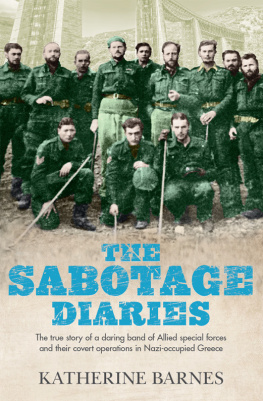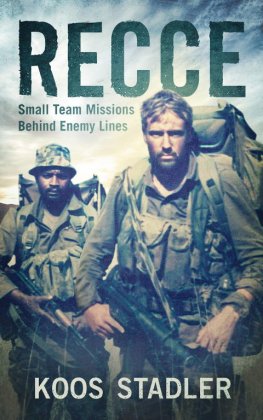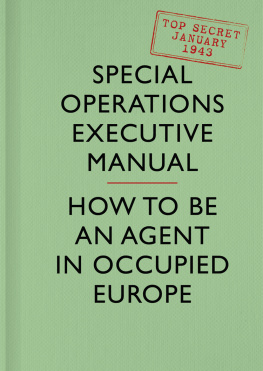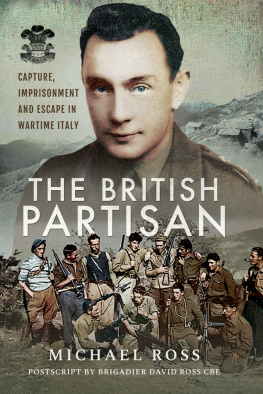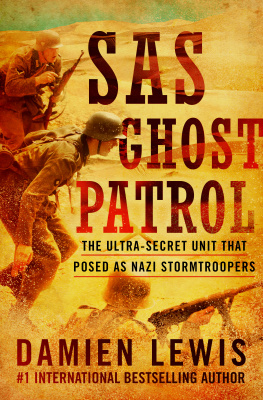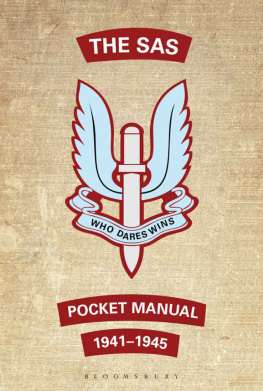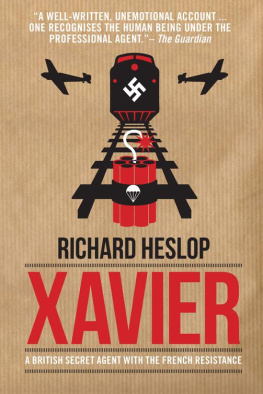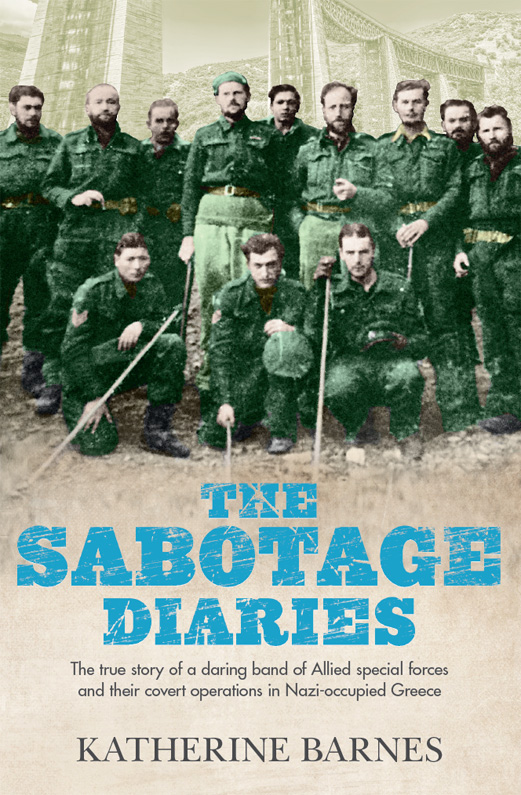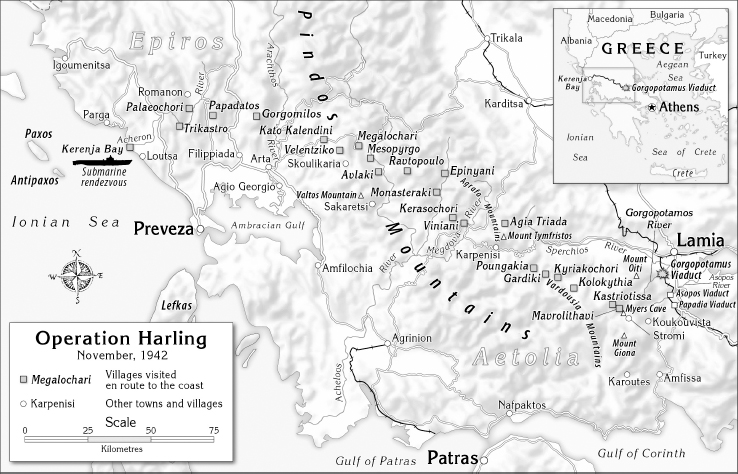
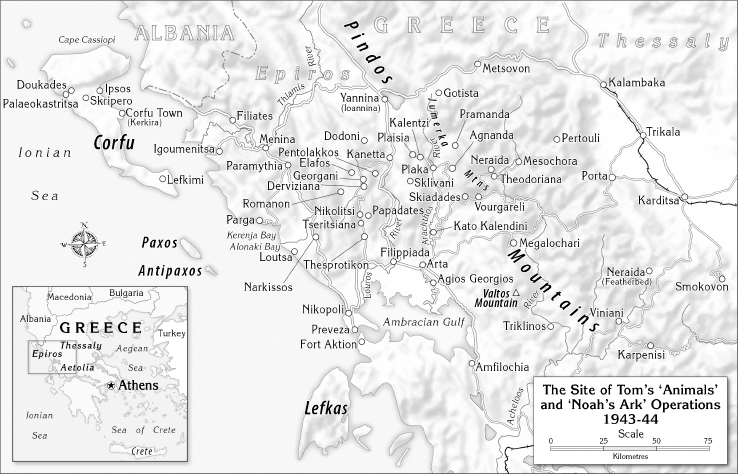
For Chris
Contents
- PART I
OPERATION HARLING - PART II
OPERATION ANIMALS - PART III
OPERATION NOAHS ARK
Guide
In early 1941, Tom Barnes embarked in the Nieuw Amsterdam for service in North Africa with the New Zealand Engineers.
Put to work building fortifications in Egypt, well away from the front, Tom couldnt have imagined that in October 1942 he would find himself parachuting into Nazi-occupied Greece with a small party of Allied special operators. He had accepted a role as a saboteur in the Special Operations Executives Harling operation. Their task was to demolish a bridge on the Greek railway line that the Germans were using to supply Rommels army in North Africa. And that was only the beginning of his story.
Some of the techniques used in this book are more commonly employed in fiction than non-fiction.
The narrative is written as though by Tom himself. His voice has been reconstructed from the diaries, reports and letters he left behind at his death. His reflections and thoughts are based on attitudes revealed in those documents.
The dialogue is invented. However, the details mentioned in the dialogue about the people who speak, their previous service and their families are real. Their voices have been recreated from their own and others accounts.
Food, death and family are common preoccupations among those serving in difficult circumstances. Several members of the Harling party published memoirs after the war, in which they noted that food was one of the main subjects they talked about. When members of the Harling party discuss these topics, what they say is imagined but again, any personal details are real. In each case where a conversation is described, evidence from Toms diaries shows that the people speaking were actually together at that time.
With one exception, all letters are real. Speeches are invented.
Notes on chapter sources can be found at the end of the book.
There were twelve of us to begin with. Three engineers, three interpreters, three wireless operators and the three in command: Eddie, Chris and John. Twelve soldiers, under orders to carry out a clandestine operation on the east coast of Greece. Totally dependent on the support of Greek partisans, with the scarce information wed received from the Special Operations Executive in Cairo numbers, location, leadership way off the mark.
After the first operation was over, I found myself with a reputation as a saboteur. One of the best, they said in a newspaper article my mother sent over from New Zealand to my fiance Beth in Tasmania. Im not sure where they got that from. I did lead the demolition team for that first, critical act of sabotage that parts true. For the rest, Im not so sure.
I had two diaries in 1942, one green, one red. Green for Egypt, red for Greece.
The green one is fat, one day to a page. It came first. The red one is more of a notebookI had to put in the days and dates myself and keep the writing small. I had no idea when or whether I would be able to get hold of another.
There are no stains on the green diary, although it was stinking hot in Egypt a lot of the time and your shirt stuck to your back. Id spent the best part of a year building a harbour at Aqaba, that gulf running out to the east from the Red Sea that looks so little on the world map. Dredging, driving piles for the wharf, making roads. Managing D8 bulldozers and Le Tourneau scoops, and the men operating them for No. 3 Section, 21 Mechanical Equipment Company, New Zealand Engineers. I might as well have been back with the Public Works Department in Tasmania, where Id been before I joined up. Or in Christchurch a few years before that, when I was still in my twenties, for that matter except for the scenery of the Arabian peninsula, as far from New Zealand or Tasmania as its possible to imagine.
The red diary is smudged round the edges, small and light so that I could fit it into the haversack I had strapped to my chest when I slipped through the hatch of the B24 Liberator that night at the beginning of October 1942. Some of the pages are so blurry I can hardly make out the words now. Couldve been sweat, or melted snow both at once, maybe, as we struck desperately through the mountains away from the Italians, making for the submarine rendezvous on the west coast of Greece.
September 29 was a Tuesday. Thats when the green diary stops. Id finished up at Aqaba and taken some leavePalestine, the Lebanon and then Syria before heading back to Cairo. Id got a letter from Beth, giving me a blast for not telling her about the trip. Quite right, too. She would have loved Palestine, and among all the beautiful girls I saw in the streets of Beirut she would still have been a standout. I was suffering from desert sores, especially the one on my big toe. It was going to need serious attention now I was back at Maadi, the New Zealand Forces camp outside Cairo.
The camp itself was comfortable enough. It was about nine miles south of Cairo, past the suburb of Maadi, right at the edge of the desert, with wooden huts for sleeping if you were lucky and a view to the pyramids from the nearby slopes. A bit of a home away from home amid the strangeness of Egypt. The canteens were stocked with familiar foods; we even had our very own pie factory.
I was on administrative duties and not enjoying it very much when, quite unexpectedly, a message arrived. Report immediately to the CRE.
The Commander, Royal Engineers of 2 New Zealand Division was Lieutenant-Colonel Bull Hanson. I would find him at the Kiwi rest home beside the Nile. Trying to suppress my curiosity, I walked in, past injured soldiers returned from the front, who were resting in wicker armchairs, or heading off to the pool with towels over their shoulders. Ladies from Cairo and the surrounding suburbs, who staffed the club as their contribution to the war effort, were hovering solicitously over the convalescents.
Hanson had just got back from Headquarters NZ Engineers in the Western Desert. A civil engineer by training, in the first war hed served in the Wellington Regiment. More importantly, hed been on the winning New Zealand army side in the 1919 Empire rugby tournament.
While wed been in Aqaba doing construction work, the front had seemed a long way off, and news had come through in a dribble. We knew the New Zealand Division had been in the thick of it around El Alamein since early July, and we were jealous. We felt we were missing out on the action. Thats when I had started trying to get into the Division as a sapper a military engineer and thats what had brought me back to Cairo.
Tom, said Hanson, getting up as I walked in. Good to see you again. The sun shining through the window was lightly touching the short, tight curls that sat close to his head; they looked rather like the curly fleece of a carpet sheep.
Wed met already, at the Engineers dinner the previous week, and talked about roads and harbours the sort of conversation only engineers can enjoy, I suppose. Hed built a road from Alamein to Kaponga without any heavy machinery. Id dredged the harbour at Aqaba without a dredge. Wed had plenty to talk about.

